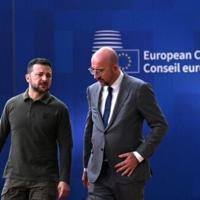EU leaders have reached an agreement at the summit to reappoint Ursula von der Leyen as the head of the European Commission and appoint Estonia’s Prime Minister Kaja Kallas as the bloc’s top diplomat. The deal, announced late at night by EU officials, distributes the top institutional roles of the bloc for the next five years, with former Portuguese Prime Minister Antonio Costa set to lead the European Council, which brings together member states.
All three nominees are part of the centrist alliance that currently dominates the EU parliament after recent elections, despite notable gains by far-right parties such as Italy’s Giorgia Meloni, who expressed public opposition to the top jobs deal. While Costa, von der Leyen, and Kallas hail from three leading political groups, they still need to garner majority support in the European Parliament, starting with a crucial vote on the commission chief in July.
Having been tested by various crises during her first term, including the Covid pandemic and the Ukraine war, former German Defense Minister von der Leyen, aged 65, is expected to face a new set of significant challenges if confirmed, ranging from the Russian threat to climate change and the rise of China.
The lineup for the top roles was largely expected, as a select group of leaders had already agreed upon the draft deal days earlier. The agreement allocates positions among von der Leyen’s center-right European People’s Party (EPP), Costa’s Socialists and Democrats (S&D), and Kallas’s centrist Renew Europe.
Additionally, it is anticipated that the EPP’s Roberta Metsola will be reinstated as the President of the EU Parliament. Despite the centrists’ strong position, there was a consensus that a deal should not be forced without mutual agreement.
While Hungarian Prime Minister Viktor Orban criticized the agreement as a manipulation and deceiving the European voters, his opposition was not sufficient to derail the deal’s approval, which required the support of at least 15 out of the 27 EU leaders.
Leaders were particularly focused on gaining Italy’s Meloni’s approval, who raised objections to the deal-making process. Italy’s significant role in the EU leadership and the success of Meloni’s party were emphasized as key factors to consider in the negotiations.
– ‘No Europe without Italy’ –
Notable leaders at the summit, including Polish Prime Minister Donald Tusk, underlined the importance of Italy in EU decisions and sought to address Meloni’s concerns. The sentiment was echoed by other leaders, reinforcing the need for Italy’s involvement in the decision-making process.
In her interactions with EU leaders, von der Leyen acknowledged Meloni’s concerns and expressed openness to exploring solutions related to migrants, as Italy has been actively involved in processing migrants in third countries.
Despite not securing a prominent seat at the top table, Meloni advocated for Italy to have a significant role in the next European Commission, including a vice presidency focusing on industry and agriculture.
With France preparing for the first round of elections where the far-right National Rally could have a significant impact, there was a clear urgency to finalize the EU leadership positions.
Aside from the top positions, the summit provided an opportunity to present a unified front on Ukraine, with President Volodymyr Zelensky signing a long-term security agreement with EU leaders, following Ukraine’s commencement of formal membership negotiations.
While the agreement was praised, Zelensky highlighted the need for further actions, particularly in terms of air defense, which he emphasized as crucial on the battlefield.
ec/del/js






